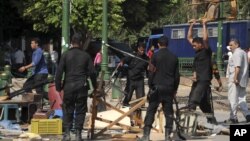Calm is returning to parts of the Muslim world after days of sometimes violent and deadly protests over an anti-Islamic video posted on the Internet.
Firefighters in Egypt Saturday doused small fires dotting Cairo's Tahrir Square, sending plumes of smoke into the air. The clean-up followed a night of clashes between demonstrators and police that left one protester dead.
In Sudan, which also saw deadly protests, police patrolled the streets of Khartoum Saturday while traffic passed by the U.S., British and German embassies, all still showing signs of damage.
Other countries which had seen days of protests, including Tunisia and Yemen, were also quieter Saturday. Still, new protests raged Saturday in Afghanistan, India and Sydney, Australia.
Also Saturday, al-Qaida's branch in Yemen called for more attacks on U.S. embassies, citing Tuesday's deadly attack on the U.S. consulate in Benghazi, Libya as the best example.
In that attack, protesters breached the consulate's security and killed U.S. Ambassador to Libya Christopher Stevens and three of his staffers. Some U.S. and Libyan officials say the attack was planned and that the attackers used the protest as a cover.
Late Friday, U.S. Defense Secretary Leon Panetta told Foreign Policy Magazine's National Security channel that Washington is positioning its forces to protect American personnel and respond to continued unrest, as needed.
Other governments have also increased security. Egyptian forces sealed off the area near the U.S. Embassy in Cairo, Friday and took dozens of protesters into custody overnight.
At least five protesters have died in this week's protests, including two in Tunisia, one in Lebanon and Egypt, and at least one in Sudan.
Firefighters in Egypt Saturday doused small fires dotting Cairo's Tahrir Square, sending plumes of smoke into the air. The clean-up followed a night of clashes between demonstrators and police that left one protester dead.
In Sudan, which also saw deadly protests, police patrolled the streets of Khartoum Saturday while traffic passed by the U.S., British and German embassies, all still showing signs of damage.
Other countries which had seen days of protests, including Tunisia and Yemen, were also quieter Saturday. Still, new protests raged Saturday in Afghanistan, India and Sydney, Australia.
Also Saturday, al-Qaida's branch in Yemen called for more attacks on U.S. embassies, citing Tuesday's deadly attack on the U.S. consulate in Benghazi, Libya as the best example.
In that attack, protesters breached the consulate's security and killed U.S. Ambassador to Libya Christopher Stevens and three of his staffers. Some U.S. and Libyan officials say the attack was planned and that the attackers used the protest as a cover.
Late Friday, U.S. Defense Secretary Leon Panetta told Foreign Policy Magazine's National Security channel that Washington is positioning its forces to protect American personnel and respond to continued unrest, as needed.
Other governments have also increased security. Egyptian forces sealed off the area near the U.S. Embassy in Cairo, Friday and took dozens of protesters into custody overnight.
At least five protesters have died in this week's protests, including two in Tunisia, one in Lebanon and Egypt, and at least one in Sudan.
Some information for this report was provided by AP, AFP and Reuters.





